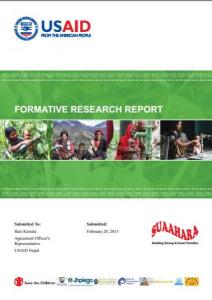Suaahara Formative Research Report
Suaahara is a 5 year, USAID-funded project designed to improve the nutrition women and children living in Nepal. Suaahara tackles undernutrition by examining the variety of factors that contribute to poor nutritional status including poor dietary intake and poor health status. Healthy timing and spacing of pregnancies is also an important part of the project given Suaahara’s mandate to reduce stunting among children and anemia and chronic energy deficiency among women.
The purpose of this formative research was to describe infant and young child feeding practices, caregiving practices and hygiene behaviors in 6 of the 20 districts in Nepal where Suaahara works. Researchers also identified determinants of those behaviors. Additionally, they identified families’ aspirations for their children. This report describes what waslearned and how th team will apply this learning to improve the nutritional status of women and children.
A full listing of current practices, barriers, target audiences and behavior change strategies appears at the end of this report and constitutes core recommendations and ways forward.
Source: Johns Hopkins Bloomberg School of Public Health/ Center for Communication Programs
Date of Publication: March 25, 2019
SIMILIAR RESOURCES
Tools
Examples
- Suaahara Training Guidelines and Participant Handbooks
- GESI Toolkit
- Maternal Newborn Child Health - Nutrition Quality Improvement Tools
- Suaahara Health Facility Operation and Management Committee Capacity Building Training and Operation Guidelines
- HTSP Project Briefs: Niger, Togo
- Reaching First-Time Parents and Young Married Women for Healthy Timing and Spacing of Pregnancies in Burkina Faso
- HTSP Changes Lives
- HIV Evidence Infographic: Continuum of Care
- Using Data to Design an Evidence-based Social and Behavior Change Program in Rural Nepal
- Care of Mosquito Nets Toolkit

